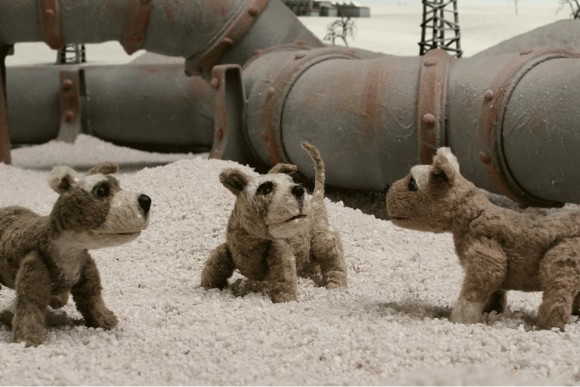The presentation covered nine films, including two Austrian coproductions, one Russian coproduction and one Hungarian, German and Czech coproduction. For Czech/Austrian co-production Deckname Holec, Austrian director Franz Novotny is adapting a Jan Němec story based on his real-life experience of smuggling film reels of the August 1968 Soviet invasion into Austria. The film is being produced by Dawson Films and coproduced by Czech Television and Novonty & Novonty Film Production in Austria. Another Czech and Austrian coproduction, Menandros and Thais, is also in the postproduction stage. An experimental adventure film, it is produced by Die Gruppe in Germany and coproduced by Prague’s FAMU and Czech company Nutprodukce. The producers are still looking for 100,000 CZK to complete the project.
The thrilling presentation of Hungarian/Czech/German project Zero, directed by Hungarian filmmaker Gyula Nemes, won over the audience and Czech producer Jiri Konecny received the prize for best presentation. Nemes, who usually works as a documentary filmmaker, studied film at the FAMU film school in Prague. Based on the premise that if all bees die, mankind will die out within a year, the film has already been edited and is currently in the postproduction stage and expected to be released later this year. The film is coproduced by Katapult Film in Hungary, Endorfilm in the Czech Republic, and 42 film in Germany. It is supported by the State Cinematography Fund and the Hungarian National Film Fund. There is no Czech distributor or sales agent yet.
Aurel Klimt's first feature Laika, an animated Czech sci-fi musical that's been in the making for the past five years, is due to be released in 2017 to coincide with the 60 year anniversary of when the Soviet space dog Laika became the first animal launched into orbit. The film is produced by Czech company Studio Zvon, and coproduced by Universal Production Partners and Studio Bystrouška, with backing from the MEDIA Programme and the State Cinematography Fund.
Projects still in development include the debut Agnes & Andrej, it is directed by Tomasz Winski who has just graduated from film school. The film is based on a play by Hungarian playwright Klara Kolarova and is about a woman who becomes obsessed with an older photographer. The presenters say the film is targeted at neighbouring post communist countries. The producer is Katerina Dolezalova from Duracfilm.
Director Dan Wlodarczyk's social drama Green Horse Rustlers, is now in development. "South Africa has its diamonds and gold diggers, we here in South Bohemia have moldavite and its illegal miners", said the director, who also hails from South Bohemia. The team is still location hunting and casting. The film will be supported by Czech Television, which has covered most of the financial needs of the project's 21m CZK budget. The film is being produced by Viktor Schwarcz from Cineart TV Prague and the expected release is in September 2016.
Domestic, a Czech film directed and written by Adam Sedlak, will be released in Autumn next year. The film focuses on a cyclist whose role is a domestic in a second-division cycling team. The director emphasises that the film won't be a sports drama and that it will be very minimalist - he is inspired by Polanski films like Repulsion (1965) and Rosemary's Baby (1968). The budget is quite low at 5m CZK, but this is partly because most of the film is shot on one location and with two actors. Sedlak would like to start filming in April or May 2016. The project is still looking for the main actress to play the role of Sarlot, Roman's wife who wants to have a baby.
A Midpoint Central Europe Script Centre project was also presented from screenwriter and director Taťána Rubášová, whose biographical drama My Sudek is scheduled for release in 2018. The film is being produced by Yvona Teysslerova from Mionshe Studio and the current budget is 8m CZK. Finally, Death in Russia, an ambitious project from director Ondrej Provaznik will be shot in Russia and the Czech Republic. Produced by Prvni Verejnopravni and coproduced by Dum in Russia, there will only be one copy of the film. "The movie will be shot on 16mm inverse film stock, the processing will be classical and thus there will only be one copy, the original" says producer Kopecky. The film will be able to be screened an estimated 80 times before it is destroyed, reflecting the title of the film.
Every year, the Czech Film Centre publishes a catalogue in Czech and English, showcasing all the Upcoming Czech Feature Films for the year. The 14th version gives information on more than 90 Czech feature and animated projects in different phrases of preparation - in development, in production and in postproduction.




















